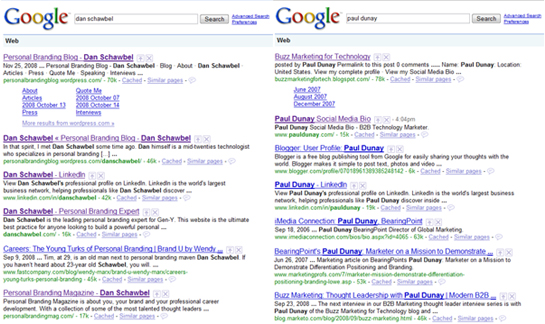I spoke with Paul Dunay last night, who is the Global Director of Integrated Marketing at Bearing Point, as well as a B2B technology marketing blogger. During our call, we talked about people’s Google results and what that says about them. Our conversation sparked this post, which deals with identifying your current “Google results” situation and deciding what you want to show up for your personal brand.
There are a few main reasons why you should pay attention to your Google results:
- Journalists are Google’ing topics to find sources for their articles.
- Managers are Google’ing your name to ensure you are legitimate and as an evaluation of your skills.
- Bloggers are Google’ing your name (or your topic) to either find out more about you or to link to one of your posts.
- Admissions officers are Google’ing your name to verify that you don’t have digital dirt.
- Parents are Google’ing your name because they love their children and to see if their children’s friend (possibly you) isn’t a convict.
- Teachers are Google’ing your name to see if you’re a good resource to speak to their class.
- HR is Google’ing your name to ensure you’re writing doesn’t go against company policy.
- Coworkers are Google’ing your name, when they should be working on projects!
- Males/females are Google’ing your name before and after your first date to see if they should go on the next.
- YOU are Google’ing your name because you love yourself too much 😉

Analysis of my/Paul’s Google results
If you Google my name, you will see a page that represents me quite well. I’ve purposely arranged my Google results to best reflect my brand. Frankly, I have to do this, in order to show everyone else how to do it and because I’d lose credibility if my results were flawed. My blog ranks #1, which shouldn’t surprise you because of the amount of links and content. The other results reflect my professional resume (LinkedIn), as well as the Fast Company article that put me on the map and my other websites: the magazine and my branded homepage.
If you Google Paul’s name, you get his popular blog first, which has a lot of links and content. Then you get his main page or, as we call it, “personal brand page.” This page contains Paul’s entire life and is blessed with many social media elements. Aside from that, you get his LinkedIn resume and a few contributing articles he’s written for various publications. Basically, the results match him perfectly.
So what does your Google results say about you? Are you happy with them? Google yourself right now!












